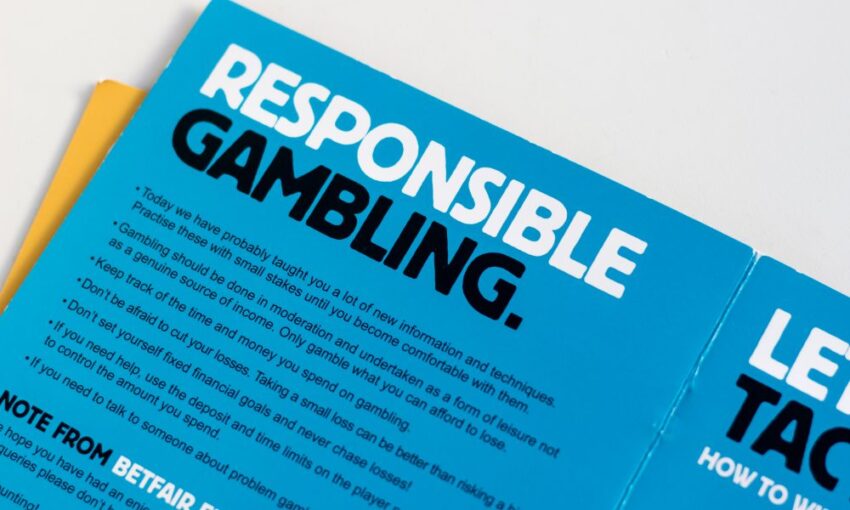It’s about more than money...
Our foremost concern is ensuring your safety and pleasure while engaging in online gambling. Our objective is to provide an enjoyable experience for all as they partake in their preferred games through top-notch casinos. What we aim to avoid is any adverse influence that betting or gaming could exert on you and your lifestyle. This is precisely why we have curated an array of valuable tools, insights, suggestions, and references. These resources are designed to facilitate your continued enjoyment while also promoting responsible gambling practices.
What is responsible gambling?
Engaging in responsible gambling involves playing for enjoyment, maintaining complete command over your gaming activities and expenditure, adhering to predetermined limits, and avoiding any detrimental financial or emotional consequences due to your participation.
If you find yourself struggling to maintain control, grappling with emotions of despair, facing financial strain, being dishonest about your gaming frequency, attempting to recover losses, or sensing an overall negative impact from your gaming, you may be in danger of developing or already grappling with gambling addiction.
7 tips for responsible gambling
In order to assist you in maintaining responsible gambling practices, regardless of whether you favor online play from home or mobile devices, frequent local casinos or bingo halls, or opt for any other gaming environment, the advice provided below is designed to minimize the likelihood of encountering issues.

Set a budget and stick to it
Setting a budget is among the pivotal steps to engage in responsible gambling. Determine the amount you are comfortable allocating for gambling on a weekly or monthly basis and uphold that limit consistently.
Don’t chase your losses
If you experience losses while gambling, refrain from attempting to recoup them by increasing your gambling activity. This approach is guaranteed to result in further financial setbacks.


Take breaks from gambling
In situations where you notice that your gambling has exceeded your initial intentions, or if you sense heightened stress or anxiety linked to your gambling activities, it’s advisable to pause. Allocate a few days or potentially a week away from gambling to refresh your mindset and reestablish healthier gaming patterns. Should you require an extended break, contemplate utilizing gambling exclusion services to ensure your well-being.
Be aware of the odds
While engaged in gambling, maintaining an understanding of the odds is crucial. It’s essential to acknowledge that the likelihood of winning is consistently tilted against your favor, meaning that winning every time is not a realistic expectation. To enhance your informed betting and minimize risks, our resources like the “Facts about Sports Betting” and “Insights into Slots” guides can offer you deeper insights into the realities of gambling.


Don’t gamble when you are emotional
Engaging in gambling while experiencing emotions like anger, sadness, or stress can result in poor choices. When emotions are running high, it’s advisable to postpone gambling until you’ve regained your composure and reached a state of calm.
Do not gamble when you are under the influence of alcohol or other substances
The consumption of alcohol, prescription drugs, or recreational substances, regardless of their legality, can influence your mental state and render you susceptible to poor judgment. Unless you are composed and thinking rationally, there’s a tendency to embrace higher levels of risk while under these influences, and this poses a significant issue in the context of gambling.


Seek help if you are struggling
In the event that you encounter challenges with gambling, there are readily accessible resources to provide assistance. In numerous countries where gambling is legalized, a multitude of organizations and services extend aid and guidance to individuals facing gambling-related issues or those susceptible to such concerns.
If you’re encountering challenges adhering to the aforementioned suggestions, it could indicate a potential indication of gambling addiction. We suggest considering a complimentary self-evaluation assessment offered by a responsible and safer gambling service. This assessment can assist in evaluating your behaviors and gauging the likelihood of encountering gambling-related problems.
Recognizing Indicators of Compulsive Gambling in Oneself and Loved Ones
The reality concerning gambling addiction is that it can emerge within anyone, particularly when responsible gambling counsel is disregarded. If you or someone close to you enjoys gambling and you hold concerns about potential issues arising, the compilation below is designed to assist you in identifying potential indicators of problematic gambling behavior:
Preoccupation with gambling
The individual might engage in frequent discussions about gambling or allocate significant time pondering over it. Additionally, they could structure their daily schedule around gambling activities or come up with justifications to partake in gambling endeavors.
Needing to gamble with increasing amounts of money to get the same thrill
This phenomenon is referred to as tolerance. Initially, the individual might wager small sums of money, but as time progresses, they will find it necessary to bet increasingly larger amounts in order to attain the same level of excitement.
Trying to control, cut back, or stop gambling, without success
The individual might attempt to cease their gambling habits, but they will encounter significant challenges in doing so. They could even create personal commitments or assurances to themselves and others about quitting gambling, only to eventually falter and break these commitments.
Feeling restless or irritable when they try to cut down on gambling
This indicates withdrawal symptoms. When an individual discontinues gambling, they might undergo both physical and emotional reactions, including sensations of anxiety, melancholy, and irritability.
Gambling to escape problems or relieve feelings of helplessness, guilt, anxiety, or depression
The individual might resort to gambling as a mechanism to manage challenging emotions or circumstances. They could perceive gambling as their sole avenue for escaping from their problems.
Chasing losses
This is when the person gambles more money in an attempt to win back money they have already lost. This is a very destructive cycle, as it often leads to even greater losses.
Lying to family members or others to hide the extent of their gambling
The individual could falsify information regarding their gambling frequency, the extent of their financial losses, or their whereabouts. Additionally, they might endeavor to conceal their gambling activities from others by opting for online gambling or selecting casinos located at a distance.
Risking or losing important relationships, a job, or school or work opportunities because of gambling
The individual’s gambling tendencies might begin to disrupt their professional commitments, educational pursuits, or interpersonal connections. They could skip work or school engagements and disregard their relationships to prioritize gambling.
Asking others to bail them out of financial trouble because they gambled money away
The individual might seek financial assistance from acquaintances, family members, or even unfamiliar individuals to offset their gambling setbacks. They could also exhaust their credit card limits or resort to acquiring loans with the intention of using the funds for gambling purposes.
In the end, if concerns arise that a friend or family member could be in the process of developing or already grappling with a gambling issue, engaging in a conversation with them becomes crucial. Strive to approach the discussion without being confrontational, instead extending your support and assistance in identifying resources and services that can offer the necessary help.
If you identify these indications within yourself, seeking assistance promptly is vital. There are several resources available for you to turn to, including:
These initiatives can furnish you with the necessary assistance and therapy to triumph over your addiction.
Gambling addiction treatment programs
These helplines can furnish you with information and assistance concerning issues related to problematic gambling.
Gambling hotlines
These services can aid you in comprehending your gambling patterns and devising approaches to effectively regulate them.
Gambling counseling services
These gatherings can offer you encouragement from individuals who comprehend the challenges you’re facing.
Gambling support groups
Getting professional help
While utilizing self-exclusion and blocking tools plays a vital role in addressing and managing gambling addiction, an integral aspect of responsible gambling involves seeking assistance and guidance from seasoned professionals trained to identify and address problem gambling.
To facilitate your initial step, we’ve collaborated with addiction experts Aaron Sternlicht, LMHC, CASAC, and Lin Anderson, LMHC, M.A., Ed.M., to create an authoritative guide on gambling addiction. This guide aims to aid you in your journey towards accessing the necessary professional help and advice.
Should you believe that more personalized guidance or direct conversations are necessary, it’s fortunate that numerous countries with regulated gambling industries offer an array of support options. The United Kingdom is no exception, boasting an extensive selection of helplines and specialized counseling services.
To simplify your quest for the assistance you require, we’ve compiled a list of some of the most valuable resources below:
BeGambleAware

BeGambleAware, a charitable organization located in the UK, provides individuals with gambling-related issues access to information and materials. They furnish a self-exclusion feature designed to prevent entry to gambling websites and applications.
Contact Information
- Website: https://www.begambleaware.org/
- Social Media: Facebook, Twitter, Instagram
BigDeal

A segment of GamCare, BigDeal provides assistance targeted at the youth, offering them the necessary guidance and knowledge concerning gambling, for their personal understanding as well as for those in their circle.
Contact Information
- Website: https://www.bigdeal.org.uk/
- Social Media: Facebook, Twitter, Instagram, YouTube
Gamblers Anonymous

Gamblers Anonymous oversees regional support gatherings that adopt the identical 12-step methodology for overcoming addiction as Alcoholics Anonymous. Likewise, there exist GamAnon support groups dedicated to assisting friends and family members.
Contact Information
- Website: https://www.gamblersanonymous.org.uk/
- UK Phone: 0330 094 0322
- NI Phone: (028) 7135 1329
- Email: info@gamblersanonymous.org.uk
- Additional Choices: Chat room, Locate a meeting
Gambling Therapy

Administered by Gordon Moody, this service provides free pragmatic guidance and emotional assistance for individuals experiencing adverse impacts due to gambling. It presents live support, a text-based feature that facilitates direct interaction with an advisor.
Contact Information
- Website: https://www.gamblingtherapy.org/
- Email: support@gamblingtherapy.org
- Social Media: Twitter
- Additional Choices: Live chat, Support groups
Gordon Moody Association

Gordon Moody Association, a recognized charitable organization, extends residential aid and therapy for individuals profoundly ensnared in gambling addiction. Their services encompass counsel, educational resources, therapeutic assistance, and insights into regaining authority over one’s gambling habits.
Contact Information
- Website: https://gordonmoody.org.uk/
- Email: help@gordonmoody.org.uk
- Social Media: Facebook, Twitter, Instagram, YouTube
- Additional Choices: Live chat
NHS Northern Gambling Service

The NHS Northern Gambling Service furnishes specialized addiction treatment across northern England, encompassing the northern Midlands as well.
Contact Information
- Website: https://www.leedsandyorkpft.nhs.uk/our-services/northern-gambling-service/
- Phone: 0300 300 1490
- Email: referral.ngs@nhs.net
- Social Media: Twitter
- Additional Choices: Contact form, Self-referral form
- Operating Hours: 9am – 5pm, Monday – Friday
NHS Southern Gambling Service

The NHS Southern Gambling Service delivers a dedicated program catering to individuals grappling with gambling-related issues, rendering specialized treatment.
Contact Information
- Website: https://www.southernhealth.nhs.uk/our-services/a-z-list-of-services/gambling-service
- Phone: 02382 310000
- Email: southerngamblingservice@southernhealth.nhs.uk
- Additional Choices: Self-referral form
- Operating Hours: 9am – 5pm, Monday – Friday
West Midlands Gambling Harm Clinic

The Gambling Harm Clinic of the West Midlands delivers specialized addiction therapy aimed at individuals encountering challenges related to gambling.
Contact Information
- Website: https://www.midlandsgamblingclinic.org/
- Phone: 0300 123 0996
- Email: westmidlandsgamblingharmsenquiries@mpft.nhs.uk
- Social Media: Twitter
- Additional Choices: Self-referral form
Samaritans

The Samaritans offer round-the-clock, confidential emotional assistance for individuals facing distress, which includes challenges stemming from gambling addiction.
Contact Information
- Website: https://www.samaritans.org/
- Phone (24/7 freephone): 116 123
- Welsh language support (7pm – 11pm daily): 0808 164 0123
- Email: jo@samaritans.org
- Freepost Address: SAMARITANS LETTERS
- Additional Choices: Self-help app
Ensuring the safety of kids
Although it’s against the law in many nations for minors to engage in gambling activities, it’s crucial to educate them from an early age about gambling and how to ensure their well-being if they opt to participate when it’s legally permissible. If you’re uncertain about initiating this conversation and the measures you can implement to safeguard them, we’ve compiled a series of actions you can consider:
Talk to your children about gambling
Set a good example
Monitor your children's online activity
Talk to your children about the dangers of loot boxes
Teach your children about financial responsibility.
Use blocking tools to add a layer of protection
Frequently Asked Questions (FAQs)
Responsible gambling involves a set of guidelines to ensure that online gambling remains both enjoyable and safe.
Several measures can be adopted to engage in responsible gambling. These encompass establishing budgets, setting time constraints, avoiding gambling under the influence of substances, playing for entertainment with expendable funds, refraining from chasing losses, and never exceeding financial limits.
Problem gambling is a medical condition characterized by an inability to control the urge to gamble, even when it results in harm. This can significantly impact one’s life, and if you suspect you’re grappling with it, there are listed options available to seek assistance.
Indications of problem gambling encompass an obsessive focus on gambling, loss of control over one’s gaming activities, pursuing losses, dishonesty about gambling habits, encountering financial issues due to gambling, experiencing relationship discord due to gambling, and facing emotional turmoil stemming from gambling behaviors.
Certainly, responsible gambling can assist in monitoring your expenditures and overall finances. It can aid in establishing and adhering to a budget, along with introducing tools for tracking your monthly financial status.
Yes, most reputable banks offer help in matters of responsible gambling. This typically involves blocking transactions to gambling platforms. Some banks may also extend financial planning advice if you’re in debt due to gambling and offer general financial management assistance.
Absolutely, it’s crucial to educate children on how to gamble responsibly if they choose to do so in compliance with the law. Additionally, it’s important to educate them about the incorporation of gambling elements in the realm of video games, such as loot boxes, which could potentially lead to the development of gambling addiction.




